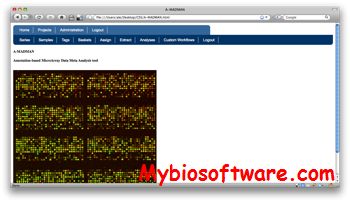cisMetalysis 1.3
:: DESCRIPTION
Metalysis is meant for revealing higher level insights from multiple gene expression data sets. In particular, if you have up- and down-regulated gene sets from several different conditions and want to know what might be common to those different gene sets, you can use the Metalysis program.
“cis-Metalysis” is an extension to Metalysis specifically designed to use motif target sets as annotation sets. It takes gene target predictions of the transcription factor motifs and then uses the Metalysis framework to identify meta associations between a motif and set of conditions. Because of the general consensus that condition-specific expression of a gene may be determine by combinations of transcription factors, cis-Metalysis also searches for motif combinations associated with expression.
::DEVELOPER
The Sinha Lab
:: SCREENSHOTS
N/A
:: REQUIREMENTS
- Windows / Linux / Mac OsX
- C++ Compiler
:: DOWNLOAD
 cisMetalysis
cisMetalysis
:: MORE INFORMATION
Citation
Proc Natl Acad Sci U S A. 2012 Jun 26;109(26):E1801-10. doi: 10.1073/pnas.1205283109.
New meta-analysis tools reveal common transcriptional regulatory basis for multiple determinants of behavior.
Ament SA, Blatti CA, Alaux C, Wheeler MM, Toth AL, Le Conte Y, Hunt GJ, Guzmán-Novoa E, Degrandi-Hoffman G, Uribe-Rubio JL, Amdam GV, Page RE Jr, Rodriguez-Zas SL, Robinson GE, Sinha S


